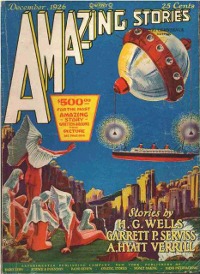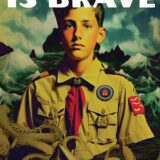Any SF library without Edgar Rice Burroughs and John Carter of Mars is hardly complete. Burroughs’ John Carter series captured the imagination of many noted SF writers, like Ray Bradbury, early in their youth. As a teenager, I noted that Burroughs works were a multimedia experience with mass-marketing appeal: comic books, comic strips, novels, and occasionally you could find some cover art sold as posters.
Burroughs’ appeal is obvious: a search for adventure and martial glory. And, yes, for teenage boys there was usually a girl involved in the story. If his SF stories had been candy, my teeth would have rotted out.
No doubt one reason was the cover art. I’m a fan of the 1930s, 40s, and 50s cover art. I love photography, and all the fancy ways of manipulating an image, but there is something primal about hand drawn images. Even if you don’t like some of the luridness, you can’t deny the power of the visceral reactions it provokes. Garish pictures with primal colors will still grab the attention of a teenage girl browsing a bookstore or passing a newsstand, no matter that the periodical is from the 1930s or the 2010s. Yes, they’re dated, but I still find those covers fascinating, even if I end up laughing. Some do it better than others, but there’s a lot to pick and chose from. Fortunately, you can find a great many Amazing Stories cover images on the internet.
 Like many readers, my introduction to SF came by way of Edgar Rice Burroughs. I stumbled across a comic book of John Carter of Mars. Found out there was a book and chased down A Princess of Mars. I was hooked. The appeal of distant lands has always called to me. As it so happens, Amazing Stories was an instrumental medium in getting Burroughs’ work out to avid fans.
Like many readers, my introduction to SF came by way of Edgar Rice Burroughs. I stumbled across a comic book of John Carter of Mars. Found out there was a book and chased down A Princess of Mars. I was hooked. The appeal of distant lands has always called to me. As it so happens, Amazing Stories was an instrumental medium in getting Burroughs’ work out to avid fans.
Some readers may recall Edgar Rice Burroughs was something of a hard case concerning the copyrights on his work. I have to wonder what comments Edgar Rice Burroughs would have to offer about the most recent attempt at making a movie out of A Princess of Mars. Disney is still smarting from the movie: John Carter.
Okay, maybe it’s been done, but I’ll throw in my two cents and then move on. Two film elements really disturbed me. First, the Martian bloodhound, Woola, was too much like a Wiley Coyote roadrunner. The way he ran around was just silly. Second, the script melded elements of various books so poorly I didn’t recognize some of the material. I reviewed hundreds of fan comments and was surprised so many fans believed that the movie was true to the original work. Perhaps they didn’t read the books, but scanned Cliff Notes. At that point, I took up the pen–briefly–to complain.
This mishap got me thinking. What is this thing we have about books being adapted to film? Let’s jump into the gravity well and see if we get crushed or if maybe it will takes us somewhere new.
Favorite books, my theory goes, must be shared. Reading is primarily private; it’s a personal experience. You establish a rapport with the writer’s thoughts and, in the act of reading the book, you have a Zen-like experience. You become one with the writer, one with the story and its characters. But sometimes, when we get inspired or passionate about a work, just passing the book to another reader doesn’t quite cut it. That’s why we like films.
Films provide simultaneous sharing. Films, from the opening credits to the closing credits, are a social experience. They are intended to be seen with others. They are made in a collaborative environment, initially shown in an auditorium with lots of other people. Sometimes, at the end of a particularly good movie, people express their approval by clapping. This shared experience then becomes part of the morning after show and enters into the collective consciousness of the nation, perhaps a significant portion of the planet’s population.
Film adaptations, then, become a form of social validation of our literary accomplishments. By implication, only the best literary works are made into films. Hmmmmmphhhh! Well, I can’t buy that and I hope you don’t either. For one thing, we’d be stuck with downgrading literary accomplishments when a movie fails. We can’t have that.
I wonder if anyone else believes that some literary works ought to be protected from adaptation mutilation. Sounds like a job for a xenogeneticist to me. Alternately, we could have a public nomination process whereby certain works are granted extended copyright privileges. You know, something that would prevent the necessity of employing the services of a xenogeneticist. Obviously, someone should be punished beyond a mere public declaration that “you have been a very bad person.” A declaration of persona non grata would just be a start. Alas, it’s not up to me.
It might be worth mentioning that current copyright laws do not protect a writer’s ideas, only the expression of those ideas. The U.S. Constitution’s authors only intended copyrights to spur on invention and advance scientific achievements. They didn’t want to hamstring progress. Now let’s be clear on this point. Dismembering literary works is not my idea of progress.
So why hasn’t John Carter successfully made the movie transition? One trend I’ve noticed is character and /or story compression. Movie adaptations use great chunks of a character’s series. Marvel comic book adaptations are a prime example: Daredevil, Electra, Hulk, Ironman, Thor, Spiderman, Captain America. These stories distilled a lot of the character into two hours. John Carter was a mishmash of elements from several books and with material that was never in the books. There have been previous attempts at making John Carter of Mars movies. (One movie I watched was so bad that … well, I just can’t talk about it.) It’s is a real shame because I’d really like to see a good version of John Carter brought to the screen. To be fair, the green men of Mars, although computer generated, were expertly rendered and culturally plausible. It gives me hope that another effort might someday be more successful.
No doubt arguments can, and will, be made by feminist apologists that Burroughs is patriarchal. This is true. But such arguments are anachronistic and too much like shouting at the solar wind. I accept that such works are a snap shot of human evolution, but not a final definition of the human condition. I don’t believe that the solution is to ban or burn every book that doesn’t meet with current cultural approval. Neither should you. I can live without such final solutions.
I still own every one of his Mars series volumes. I find myself rereading at least one of them every year. Every time I visit a new city, I rummage through a local bookstore and always seem to come across at least one copy of A Princess of Mars. There are two real tests of a book’s appeal: its re-readability and its power to attract a new generation of readers. It’s for this reason that I include Edgar Rice Burroughs and the John Carter of Mars series as essential works for your SF library.
There are several sites that offer free Ebooks such as : John Carter Book (dot) com.













1 Comment